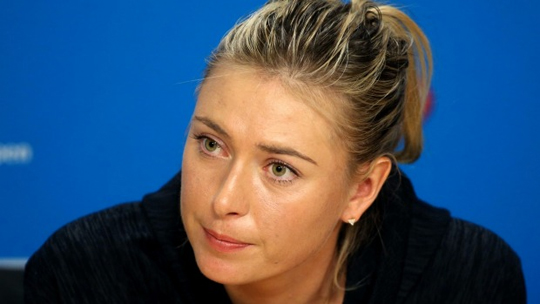Los Angeles, Mar 9: Maria Sharapova's multi-million dollar business empire was in turmoil on Tuesday as sponsors distanced themselves from the Russian tennis star a day after she admitted failing a drug test.
The world's richest sportswoman announced Monday that she had tested positive for Meldonium, a drug she said she had been taking since 2006 which was added to the World Anti-Doping Agency's banned list this year.
US sportswear giant Nike, German luxury car maker Porsche and Swiss watchmaker TAG Heuer all halted their relationship with the former world number one.
The 28-year-old, whose rags-to-riches story was the stuff of Hollywood dreams, now risks a ban of up to four years which could see her carefully constructed marketing empire collapse.
The holder of five Grand Slams and 35 WTA titles, the Russian who arrived penniless with her family in the United States, is as much a businesswoman as a sportswoman.
Despite winning just two WTA titles in 2015 she was the highest paid sportswoman that year, earning $30 million mostly from advertising, according to American magazine Forbes. Her fortune is estimated at $200 million.
Nike was the first sponsor to jump ship, saying Monday night it was "saddened and surprised" by the news.
"We have decided to suspend our relationship with Maria while the investigation continues," the US sportswear giant said.
Swiss watchmaker TAG Heuer then said they would break off negotiations to renew their contract with Sharapova.
"Maria Sharapova was under contract with TAG Heuer until December 31th, 2015. We had been in talks to extend our collaboration," a company statement said.
"In view of the current situation, the Swiss watch brand has suspended negotiations and has decided not to renew the contract with Ms Sharapova."
Porsche followed, stating "until more details are known and we can analyse the situation, we have decided to suspend planned activities (with Sharapova)".
Sharapova signed a three-year deal to be brand ambassador for Porsche in April 2013. The Russian also won the WTA indoor tournament in Stuttgart, which is sponsored by the car manufacturers, in 2012, 2013 and 2014, with the champion driving off in a brand-new sports car.
"I did fail the test and I take full responsibility for it," Sharapova said at a quickly convened press conference in Los Angeles on Monday.
"I made a huge mistake. I let my fans down. I let my sport down that I've been playing since the age of four that I love so deeply," she said.
"I know that with this, I face consequences and I don't want to end my career this way -- and I really hope I will be given another chance to play this game."
The ITF confirmed that Sharapova had tested positive on January 26 and had accepted the finding when she was notified on March 2.
"Ms Sharapova will be provisionally suspended with effect from 12 March, pending determination of the case," the ITF said.
Sharapova said she was prescribed the drug, a circulation-booster used to treat heart ailments, because of symptoms including an irregular EKG heart test and a family history of diabetes.
Her attorney, John Haggerty, said mitigating circumstances could result in a lesser penalty.
Russian officials on Tuesday threw their backing behind Sharapova.
"I feel sorry for Masha. I hope that we will see her back on court and we are prepared to support her," sports minister Vitaly Mutko told state-run TASS news agency, using the Russian diminutive of Sharapova's first name.
"The people in her team should be looking out for her."
Sharapova's great rival Serena Williams applauded the Russian's candor in confirming the positive test.
"I think most people were surprised and shocked by Maria but at the same time most people were happy that she was just upfront and very honest and showed a lot of courage to admit to what she had done and what she had neglected to look at," Williams told reporters in New York, as she prepared for an exhibition event.
"She's always showed courage in everything that she's done. And this is no different," Williams said.






Comments
Add new comment